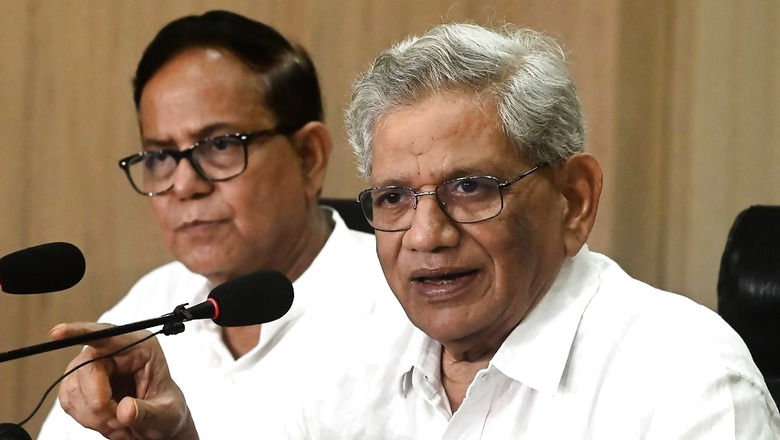
views
Veteran communist leader and West Bengal chief minister Jyoti Basu once jokingly told Sitaram Yechury during a trip to Beijing that he was “a very dangerous person”. Basu was stunned to see Yechury speaking to colleagues from different states in their languages. Fluent in Bengali, Tamil, Telugu, Hindi, and English, the late general secretary of the Communist Party of India (Marxist) had established a unique level of comfort and accessibility with comrades — starting as a student leader in Jawaharlal Nehru University (JNU) to becoming a member of the CPI(M) politburo, the party’s highest decision-making body.
Yechury died at the age of 72 in Delhi on Thursday. He was admitted to AIIMS in August with a severe chest infection. The multilingual communist with a different approach towards politics and a perpetual smile on his face was known as one of the leaders instrumental in building the opposition bloc, brick by brick.
For years, Yechury stood as one of the most credible and prominent figures in India’s leftist political landscape. Known for his sharp intellect, unyielding commitment to Marxist ideals, and decades-long political career, the CPI(M) leader was a critical voice of dissent against what he viewed as the rising tide of Right-wing politics in India.
He witnessed the slow decline of the Left, yet his unwavering belief in its core values continued to define his leadership. Yechury’s sudden and “shocking” death — as his comrades called it — deals an “irreversible” blow to the party, because he was seen as the key figure bridging the gap between generational communist-socialist ideals and the pragmatic needs of the modern Left.
The party released a statement saying, “It is with profound grief that we announce the passing away of CPIM General Secretary, our beloved Comrade Sitaram Yechury, at 3.03 pm today, 12th September, at the AlIMS, New Delhi. He was suffering from a respiratory tract infection which developed complications.
We thank the doctors, nursing staff and the Director of the Institute for the excellent treatment and care extended to Comrade Yechury.”
Saddened by the passing away of Shri Sitaram Yechury Ji. He was a leading light of the Left and was known for his ability to connect across the political spectrum. He also made a mark as an effective Parliamentarian. My thoughts are with his family and admirers in this sad hour.… pic.twitter.com/Cp8NYNlwSB— Narendra Modi (@narendramodi) September 12, 2024
Sitaram Yechury ji was a friend.A protector of the Idea of India with a deep understanding of our country.
I will miss the long discussions we used to have. My sincere condolences to his family, friends, and followers in this hour of grief. pic.twitter.com/6GUuWdmHFj
— Rahul Gandhi (@RahulGandhi) September 12, 2024
His Early Years: An Ideological Foundation
Born in Chennai in 1952, Yechury’s political awakening and alignment came early. He joined the Students’ Federation of India (SFI) during his time at JNU, where he quickly rose through the ranks, becoming an influential figure within the leftist student movement. It was during those formative years that Yechury developed his staunch Marxist-communist ideology and solidified his commitment to socialism. In 1975, he became a member of the CPM, actively participated in the movement against emergency.
His ascent in the CPI(M) was steady, reflecting his sharp analytical abilities and reputation as a skilled orator. He remained the face and voice in the party structure who was able to stand his ground, even against the party’s then-general secretary Prakash Karat for his decision to not allow Jyoti Basu to become the Prime Minister, when the chance came.
He succeeded Prakash Karat in 2015 as the general secretary of the party but with a moderate approach. His ideas took a slightly different path than the one Karat crafted for his party, as he believed in consensus, said a senior member of the politburo.
Challenges, Changes and Consequences
Yechury’s leadership marked a subtle shift within the CPI(M), as he advocated for more flexible alliances, especially with the Congress, to take on the BJP’s growing dominance. He was believed to be one of the unofficial political advisers of Congress leader Rahul Gandhi. Yechury chose to ally with the Congress in Bengal for the 2016 assembly elections. It was the first such decision since the time the Left decided to pull out of the United Progressive Alliance (UPA) in 2009 following a disagreement with ally Congress over the civil nuclear deal with the United States.
Yechury’s approach, however, sparked internal debates, as some party members preferred to maintain a distinct distance from other political formations.
Another senior communist leader said, “Unlike comrade Prakash Karat’s elitist brand of communism, Yechury’s ideology was rooted in the grassroots. The fine lines between the state lobbies like Kerala lobby, Bengal lobby, and Delhi lobby really blurred during his tenure. He recalibrated the party, travelled across states, met workers, and encouraged them to believe in the ideas and have faith. He connected with the cadres.”
Over the years, he became a key player in party decisions, navigating hurdles and ideological battles that have shaped both the Left and India’s political discourse.
Yechury’s tenure as the party’s general secretary had been riddled with challenges. The Left, once a formidable force in Indian politics, particularly in West Bengal and Kerala, has witnessed a significant decline. In the 2014 and 2019 general elections, the CPI(M) saw its worst electoral performances, with its presence in Parliament drastically reduced. The fall of the Left Front government in West Bengal in 2011 after 34 years of uninterrupted rule remains a key setback that continues to haunt the party.
Yet, Yechury’s resilience in the face of these political defeats kept the party afloat, particularly in Kerala, where the CPI(M)-led Left Democratic Front remains in power. Also, it was his tenure when the party started gaining ground and won seats in the last parliamentary elections.

















Comments
0 comment